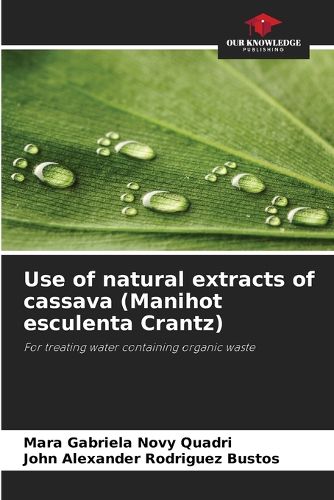Readings Newsletter
Become a Readings Member to make your shopping experience even easier.
Sign in or sign up for free!
You’re not far away from qualifying for FREE standard shipping within Australia
You’ve qualified for FREE standard shipping within Australia
The cart is loading…






This title is printed to order. This book may have been self-published. If so, we cannot guarantee the quality of the content. In the main most books will have gone through the editing process however some may not. We therefore suggest that you be aware of this before ordering this book. If in doubt check either the author or publisher’s details as we are unable to accept any returns unless they are faulty. Please contact us if you have any questions.
The use of waste from agro-industrial production and the treatment of effluents are part of the growing global environmental concern, as finding sustainable processes is a necessity for today's industry. The use of natural organic coagulants has emerged as a sustainable technology in wastewater treatment, becoming an alternative to the use of common coagulants, many of which are associated with various environmental problems. Lectins and tannins are components capable of coagulating-flocculating certain types of molecules and particles. Waste from the cassava agro-industry is rich in these compounds. However, the effectiveness of these phenomena, which can be used to treat wastewater from the food and textile industries, depends on factors such as pH, temperature, time and the type of agent that extracts this active ingredient from the plant. It is in this context that this study evaluates the agglutination capacity of crude extracts obtained from the aerial part of cassava. The hemagglutinating activity on different types of erythrocytes is evaluated, as well as the ability to remove color from aqueous solutions of cationic dyes.
$9.00 standard shipping within Australia
FREE standard shipping within Australia for orders over $100.00
Express & International shipping calculated at checkout
This title is printed to order. This book may have been self-published. If so, we cannot guarantee the quality of the content. In the main most books will have gone through the editing process however some may not. We therefore suggest that you be aware of this before ordering this book. If in doubt check either the author or publisher’s details as we are unable to accept any returns unless they are faulty. Please contact us if you have any questions.
The use of waste from agro-industrial production and the treatment of effluents are part of the growing global environmental concern, as finding sustainable processes is a necessity for today's industry. The use of natural organic coagulants has emerged as a sustainable technology in wastewater treatment, becoming an alternative to the use of common coagulants, many of which are associated with various environmental problems. Lectins and tannins are components capable of coagulating-flocculating certain types of molecules and particles. Waste from the cassava agro-industry is rich in these compounds. However, the effectiveness of these phenomena, which can be used to treat wastewater from the food and textile industries, depends on factors such as pH, temperature, time and the type of agent that extracts this active ingredient from the plant. It is in this context that this study evaluates the agglutination capacity of crude extracts obtained from the aerial part of cassava. The hemagglutinating activity on different types of erythrocytes is evaluated, as well as the ability to remove color from aqueous solutions of cationic dyes.